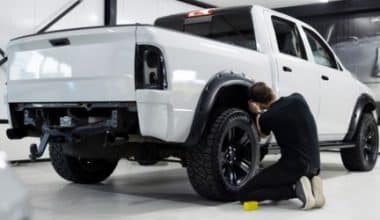When driving across Georgia, you need to always have reliable insurance. When you need reliable commercial truck insurance in Georgia, turn to American Insurance Brokers. While going without insurance is a huge risk, having inadequate protection can be just as difficult. American Insurance Brokers helps you sort through your coverage choices. They also make every effort to guarantee that your commercial vehicle insurance meets all state and federal mandates. In this article, we will discuss the cheapest commercial truck insurance in Georgia, the insurance cost, and no down payment.
What is Commercial Truck Insurance in Georgia?
Commercial truck insurance in Georgia, like in other states, provides coverage for businesses that use trucks for their operations. This type of insurance is specifically designed to protect commercial vehicles and their drivers from financial risks in case of accidents, theft, or damage to the truck. Commercial truck insurance in Georgia typically includes liability coverage, which covers damages and injuries to others in an accident where the insured driver is at fault. It may also include physical damage coverage, which pays for repairs to the insured truck, and cargo insurance, which covers the goods being transported.
Additionally, there are specialized coverages such as motor truck cargo insurance, which protects the cargo being hauled, and bobtail insurance, which covers the truck when it is not hauling a trailer. Businesses in Georgia that operate trucks are required by law to carry a minimum amount of commercial truck insurance to operate legally and protect themselves financially in case of unforeseen events.
How Does Commercial Truck Insurance in Georgia Work?
Insurance policies, from medical to property, are there to safeguard your assets in the event of a disaster. The act of driving is not immune, especially when traffic congestion increases.
You probably already know that regular auto insurance isn’t adequate for business use. In most cases, commercial use is prohibited. You need the best commercial truck insurance Georgia has to offer, whether you’re an independent truck driver or a fleet manager. This investment in your personal and company safety is essential and cannot be renounced.
Consider the following scenario: you or one of your drivers is involved in a car crash on the highway. First, there is the risk of harm, which can lead to medical expenses and time away from work. There may also be significant property damage to the other vehicles and people involved. If you haven’t complied with the legal requirements for commercial vehicle insurance, the financial consequences can be overwhelming.
However, you can rest easy knowing that you have a reliable insurance plan. You’ll be protected to the point where you can give your full attention to getting back on Georgia’s highways.
Understanding Georgia Commercial Trucking Insurance Coverages
Without the proper coverage, driving on Georgia’s roads is like attempting to eat a peach without making a mess. Here’s a rundown of the bare-bones insurance you should have:
#1. Auto Liability
Owners of trucking companies in Georgia are required by law to provide their drivers with liability insurance. Minimum limits of $500,000 per person injured and $250,000 per incident for property damage apply to trucks above 44,000 pounds. For trucks under 44,000 pounds, the minimum required liability coverage for injuries and property damage is $300,000. If your driver causes an accident and is found at fault in Georgia, he or she will be responsible for compensating the victims and repairing any damage they caused. Without proper coverage, that can cost a lot of money, fast.
You ought to purchase more insurance for your business than just the bare minimum required by law. With the correct liability insurance, you won’t have to worry if one of your drivers causes an accident or causes injury to another person. If your driver is involved in an accident, you need to make sure your business is covered.
#2. Physical Damage
Truckers in Georgia aren’t obliged to have collision or comprehensive insurance, but doing so might save you a lot of money in the event of an accident. When your truck’s driver causes damage to the vehicle, collision insurance will pay for the necessary repairs. Your comprehensive coverage will take effect if your car sustains damage from things like hail, water, vandals, or striking Bambi. You can reduce your monthly premium payments by selecting a higher deductible. A higher deductible results in reduced premium payments but higher out-of-pocket costs in the event of a claim.
Despite the fact that Georgia law does not require these insurance policies, having them can help you avoid going bankrupt due to expensive truck repairs. If you want to save money, you should talk to us about bundling your collision and comprehensive coverage with your required liability insurance. Maintain transportation flexibility by insuring vehicles against physical harm. Make sure your insurance company is aware of the specific kind of trucks you operate, whether they be semis or box trucks. Trucks vary, and so do the requirements.
#3. Transport via Truck
There are a lot of dangers involved with hauling cargo throughout Georgia, from damaged or stolen cargo to broken-down refrigerated trailers. If the products you are transporting are damaged or stolen, cargo insurance will reimburse you for the loss. If your refrigerated trailer breaks down and your perishable cargo spoils, you may be able to recoup some of your losses with reefer breakdown insurance. Although Georgia law does not require them, these safeguards are crucial for any trucking company. Let’s imagine your trailer’s cooling system malfunctions while you’re transporting a load of perishable fruits and vegetables in a reefer. Or maybe your dry van trailer is broken into and pallets of gadgets are stolen.
With cargo and reefer breakdown insurance, you can shield yourself from financial loss due to spoilage or theft. Your premium will increase inversely with the size of your deductible. Get the best rates by shopping around for insurance that specializes in covering your kind of hauls. If you lose a load, your business could go under unless you have sufficient insurance. Get the appropriate Georgia commercial truck insurance for the goods you transport in Georgia to safeguard your company’s finances.
#4. Meltdown in the Reefer
Georgia truckers transporting perishable goods should keep reefer breakdown insurance in mind. If your refrigerated trailer fails and your cargo spoils, this insurance will replace it. Imagine you own Peachy Keen Produce and transport fruit and vegetables from farms in the countryside to consumers in Atlanta. Halfway to Atlanta, the refrigerated truck breaks down with $50,000 worth of fresh Georgia peaches inside. Those peaches won’t make it until the repair truck arrives.
However, if you have reefer breakdown insurance, you will be compensated for the entire value of your lost cargo. If you didn’t have it, you’d lose a lot of money on the spoiled cargo. This protection is essential if you transport perishable goods from the port in Savannah to inland locations such as Macon or Augusta. You won’t have to worry about your perishables going bad because of a broken reefer. Investing in reefer breakdown insurance is a wise move to safeguard your profits and the future of your company. Don’t lose freight and money because of a mechanical failure!
#5. General Liability
There are many hazards to consider when operating a trucking company in Georgia, both on the road and at the company’s headquarters. That’s why it’s crucial to have business general liability insurance. It protects you financially if someone gets hurt or their property gets damaged because of your trucking company. Imagine that a visitor to your business slips and falls, requiring medical attention. Maybe one of your workers drives a forklift into a client’s storage facility and causes damage to their inventory.
General liability insurance can cover claims resulting from incidents on your property, at your places of business, or as a result of employee negligence. Despite the fact that Georgia law does not require it, any responsible vehicle owner will have it on hand just in case. Compare different policies to get the best deductible and liability limits for your needs and budget. Make sure that your business insurance covers everything, from filing taxes to loading cargo. A strong general liability policy might save your trucking company from financial ruin in the event of a lawsuit.
What Are the Requirements for Commercial Vehicle Insurance in Georgia?
The Department of Transportation has an organization called the Federal Motor Carrier Safety Administration whose job it is to regulate the trucking business. The Federal Motor Carrier Safety Administration (FMCSA) mandates that truck drivers who transport hazardous commodities or traverse state boundaries in vehicles weighing more than 10,000 pounds have between $750,000 and $5,000,000 in insurance.
You must carry $300,000 in liability insurance if your drivers transport non-hazardous materials in a vehicle with a gross vehicle weight rating between 26,000 and 10,000 pounds.
According to the state of Georgia’s recommendation, intrastate trucks must carry a minimum of $750,000 in liability insurance. Transporting oil products requires a million dollars worth of liability insurance. Trucks transporting dangerous goods must be insured for at least $5,000,000.
What Is Commercial General Liability Insurance in Trucking?
Commercial general liability (CGL) insurance in trucking refers to a policy that protects trucking businesses from financial losses due to third-party claims for property damage, bodily injury, and advertising injury. In the context of trucking, CGL insurance covers accidents or incidents that occur outside the scope of operating the vehicles, such as injuries sustained on the business premises or damage caused by advertising content. This insurance is essential because accidents involving trucks can result in significant damage and injury, leading to costly legal claims.
Furthermore, CGL insurance typically covers legal fees, settlements, and medical expenses for third parties, providing financial protection and ensuring that businesses can continue their operations without being overwhelmed by legal costs. Trucking companies, like other businesses, invest in CGL insurance to safeguard their assets and maintain financial stability in the face of unexpected liabilities.
Do Truckers Need General Liability Insurance?
When it comes to general liability, the answer is yes. It’s not only trucking companies that need this kind of coverage; it’s pretty much any business.
General liability insurance frequently covers claims for accidents involving people, damage to their property as a result of your business, and even slander. It’s worth noting that this sort of protection is distinct from the auto liability insurance that, in many places, lawfully obligates truck drivers to have in the event of an accident.
Their general liability insurance may be able to pay for medical expenses that truck drivers incur off the road and away from the truck itself. For instance, your general liability insurance may cover the medical bills of a client who suffers an injury while visiting your office or dispatch center.
While the specifics of where and how your organization operates may determine the requirements, it is always a good idea to have general truck liability insurance in place in Georgia. If you’re trying to figure out how much and what kind of insurance coverage you need for your truck in Georgia, it’s a good idea to talk to an insurance agent who has experience in the trucking industry.
Commercial Truck Insurance Georgia Cost
Let’s clarify that we’re talking about trucks operating solely within Georgia rather than interstate vehicles. In addition, the curb weight of this truck must be beyond 10,000 pounds. In that situation, the typical annual cost for an owner-operator may be anything from $8,500 to $14,000.
Furthermore, if you’re moving non-hazardous cargo in a big box truck, your insurance premiums might be as high as $750,000 a year. In addition, Georgia law mandates that box trucks carry at least $100,000 in personal injury insurance and $300,000 in property damage coverage. Commercial box trucks in Georgia, especially those that seat more than 12 people, have expensive insurance premiums due to both their size and the high risk of their drivers. The sum in question is well north of $500,000.
Commercial truck insurance in Georgia costs $1,000,000 and is also recommended if your company is involved in the transportation of oil items. Last but not least, a business auto policy with a minimum of $5,000,000 in insurance is what you’re looking at if your firm wants you to transport hazardous goods.
Truck Insurance Rates
Different factors, including driving history, location, vehicle type, and load, all play a role in determining the cost of truck insurance. The longer you drive and the riskier the vehicle and cargo, the higher your insurance premiums will be, so keep that in mind when comparing estimates.
Maintaining a spotless driving record is essential if you want to keep your commercial truck insurance premiums low. To have points removed from your license, you can also choose to take the initiative and pay for safety training. Having a significant amount of CDL driving experience is also beneficial.
Switching to an annual payment schedule rather than a monthly one can lower commercial truck insurance premiums. Saving at least 10% of your insurance premiums is possible by paying annually.
Higher deductibles are something you should be fine with paying if you have faith in your talents. Although your deductible won’t be as high, your out-of-pocket costs for accidents will be higher.
In addition, the average cost of maintaining insurance for a semi-truck falls within these ranges:
- $5000 to $7000 for primary liability
- $1000 to $3000 for physical damage
- $1600 to $2200 for occupational accident coverage
- $500 to $600 for general liability insurance
What Does Georgia Commercial Truck Insurance Cover?
If you’re looking for commercial truck insurance in Georgia, look for a policy that covers you in a variety of situations. Vehicle damage is one area in which you should always be compensated for your troubles. In addition, you and your drivers, as well as any third parties involved, must have medical insurance. You may need more extensive coverage to adequately safeguard your business, but this is the bare minimum.
From cargo coverage to on-hook towing, these are the policies we can help you set up:
- General liability
- Medical payments
- Motor truck cargo
- Motor truck general liability
- Non-trucking liability
- On-hook towing
- Trailer interchange
- Uninsured motorist
- Workers Compensation
- Commercial auto liability
- Garagekeepers legal liability
- Physical damage
- Primary liability
- Bobtail insurance
No Down Payment Commercial Truck Insurance
Securing a commercial truck insurance policy without a down payment can be challenging but not impossible. Some insurance providers offer policies with no initial down payment, allowing businesses to start their coverage without a significant upfront cost.
However, it’s essential to carefully read the terms and conditions. While there might be no down payment required, the monthly premiums could be higher to compensate for this. Additionally, insurance companies may conduct a thorough evaluation of your business, including your credit score and driving history, to determine eligibility for a no-down payment option. Comparing quotes from different insurers is crucial to finding the most affordable and suitable policy for your commercial trucking needs.
Working with an experienced insurance broker can also help you navigate the options available and find a policy that fits your budget and provides adequate coverage for your trucks and drivers.
How Do I Find Cheap Commercial Truck Insurance in Georgia?
Here’s what you need to know to get a cheap rate on Georgia commercial truck insurance:
- Shop Around: Get quotes from multiple insurance providers. Prices can vary significantly between companies.
- Compare Coverage: Ensure you’re comparing similar coverage across different quotes. Sometimes, cheaper policies might offer less coverage
- Bundle Policies: If you have multiple insurance needs, consider bundling them with one provider. Often, this leads to discounts.
- Increase Deductibles: Higher deductibles usually mean lower premiums. Just ensure you can afford the deductible in case of a claim.
- Safety Measures: Implement safety features in your trucks. Insurance companies often provide discounts for features like GPS tracking, anti-theft devices, and driver training programs.
- Clean Driving Records: Encourage your drivers to maintain clean driving records. Safe drivers are less of a risk for insurance companies, which can lead to lower premiums.
- Consider the Type of Truck: The type of truck you’re insuring affects the premium. Make sure you’re getting the appropriate coverage for your specific type of commercial truck.
- Review and update annually: Your business might change over time. Regularly review your insurance needs and update your policy accordingly to avoid overpaying for coverage you no longer require.
- Consult an Insurance Broker: Insurance brokers have access to multiple insurance providers and can help you find the best deal based on your specific needs.
Remember, while cost is important, it’s also crucial to have adequate coverage to protect your business in case of accidents or other unexpected events.
What State Has the Cheapest Commercial Truck Insurance?
Mississippi has the cheapest commercial truck insurance rates in the United States. Insurance is a standard expense in the trucking business. Its purpose is to protect you from any kind of accident, whether or not it is your fault. Rates and insurance can vary by state, with some offering comprehensive plans at reasonable rates and others charging exorbitant premiums for little protection. If you find cheap coverage that meets your demands, make sure the provider has the best quality control measures in place.
Commercial truck insurance rates in Mississippi are the nation’s cheapest. They are as much as four times lower in some states than in others. For a company operating with just one truck, the annual cost of insurance is projected at $4,664 in the state of Mississippi, but as much as $20,641 in the state of Georgia.
What Are the Benefits of Commercial Truck Insurance in Georgia?
There are land terminals at Chatsworth, Bainbridge, and Columbus, in addition to two deep-water ports in Georgia. Georgia is a hub for truckers delivering commodities and products due to its proximity to major ports and airports. In reality, in Georgia, 76.1% of the population lives in places where trucks are the only option for transporting commodities.
Here are a few more statistics that are helpful for understanding Georgia’s trucking market:
- The trucking industry in Georgia accounts for one in every 14 jobs in the state, with a total of 265,890 jobs.
- Almost all of Georgia’s 32,000 trucking companies are family-run operations.
- The trucking industry accounts for 94% of Georgia’s manufacturing tonnage.
Given these numbers, it’s clear that commercial truck drivers in Georgia need comprehensive insurance. Financial concerns about fixing the vehicle or paying your medical expenses after an accident shouldn’t be one of your top priorities. You should receive financial support from your insurance coverage that will allow you to recover and return to work as soon as possible.
Without Georgia commercial truck insurance, your business could be at serious risk. The benefits of having this coverage are too great to pass up. Insuring your property doesn’t have to break the bank, and American Insurance Brokers will help you find an option that works for you.
Do I Need Business Insurance in Georgia?
Whether you need business insurance in Georgia depends on the nature of your business and its specific requirements. However, it is generally advisable for businesses to have business insurance coverage in Georgia. Business insurance can protect you from various risks, such as property damage, liability claims, and business interruption.
It can also be a legal requirement, depending on your business type and location. It’s essential to consult with an insurance professional to assess your specific needs and comply with any legal obligations.
Best Commercial Truck Insurance in Georgia
In Georgia, there are 32,000 trucking companies that employ 62,500 truck drivers. Trucking companies face a number of dangers, including traffic accidents, theft, and unforeseen mechanical breakdowns. Operating a trucking company in Georgia requires commercial truck insurance. In the state of Georgia, it is mandated. Commercial truck insurance in Georgia can help you deal with not just the costs of fixing your truck after an accident, but also the costs of fixing other vehicles and dealing with litigation arising from injuries and fatalities. Here are some of the best commercial truck insurance companies in Georgia you can consider:
#1. Progressive
If you need commercial truck insurance in Georgia or any other state in the USA, you can get it from the industry leader, Progressive. As a firm that provides several different types of auto insurance, including liability, comprehensive, collision, roadside assistance, and uninsured or underinsured motorist coverage, Progressive is a good choice if you run a trucking company and are in the market for commercial truck insurance.
As an added bonus, they provide substantial savings on premium packages, making them a smart pick for anyone looking to get the most bang for their buck. Progressive will insure your business’ trucks, no matter how many there are.
#2. Sentry
Sentry, a company in business for more than a century, has customers in every state, including Georgia. It is a reliable option for commercial truck coverage, whether you own a single truck or a whole fleet.
Furthermore, Sentry is a smaller company than some of our other top picks for commercial truck insurance, which means you’ll get a more individualized level of service tailored to your business’s specific needs.
Sentry is our go-to insurer because of their adaptable policy options, knowledgeable claims staff who understand trucking, and qualified safety directors with decades of expertise.
#3. Hartford
The high level of pleasure from Hartford guests is something that sets it apart. We included The Hartford on our shortlist since they have a superb reputation and have been in business for 200 years or more, during which time they have insured over a million small businesses, including trucking companies.
State Farm has been around for over 200 years, making it a reliable insurance provider. Their business vehicle insurance is reliable and affordable, so we’re happy to work with them.
Is Commercial Truck Insurance Georgia Worth It?: Bottom Line
Yes, commercial truck insurance in Georgia is definitely worth it. Having insurance for your commercial truck is crucial for protecting your business from financial losses in case of accidents, theft, or other unforeseen events. It not only provides coverage for your vehicle but also safeguards your cargo and provides liability protection.
Georgia, like many other states, has specific insurance requirements for commercial vehicles. Failing to have adequate insurance can lead to legal consequences and financial liabilities. Investing in commercial truck insurance ensures that you comply with the law, protect your assets, and continue your business operations smoothly, making it a wise and necessary investment for trucking businesses in Georgia.
Commercial Truck Insurance Georgia FAQs
What is considered a commercial vehicle in Georgia?
Generally speaking, in Georgia, any vehicle that is utilized for commerce, transportation of goods, or other commercial purposes is considered a commercial vehicle. All vehicles used to transport people or goods for a fee fall under this category.
Why is commercial insurance so expensive?
Businesses present a high risk to insurers, which contributes to the high cost of commercial insurance. You have a lot more customers than you do guests at your home.
Is it cheaper to get commercial or personal insurance?
No, in most cases, commercial auto insurance is more expensive than individual policies. That’s because, in the event of an accident, the limitations for commercial policies are typically much greater. Personal auto insurance protects the driver, but a commercial policy names a company as the primary insured.
Similar Articles
- Best Commercial Auto Insurance Providers 2023
- CAR INSURANCE WITHOUT A CAR: How Does It Work?
- CAR INSURANCE COLORADO: Coverage, Cost & Best Options
- BEST INSURANCE COMPANIES IN NORTH CAROLINA 2023






